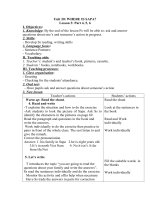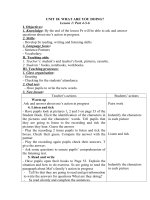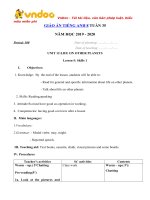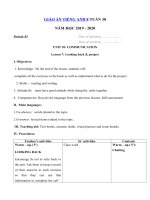Tải Giáo án tiếng Anh lớp 11 Tuần 6 sách mới - Giáo án điện tử môn tiếng Anh 11 theo tuần
Bạn đang xem bản rút gọn của tài liệu. Xem và tải ngay bản đầy đủ của tài liệu tại đây (112.06 KB, 7 trang )
<span class='text_page_counter'>(1)</span><div class='page_container' data-page=1>
<b>GIÁO ÁN TIẾNG ANH LỚP 11 TUẦN 6</b>
<b>NĂM 2019 - 2020</b>
<b>Date of preparation: </b>
<b>Date of signing: </b>
<b>Period 16: </b>
<b>Unit 2: RELATIONSHIPS</b>
<b>Part 7: Communication & Culture</b>
<b>I. Objectives</b>
By the end of the lesson, students will be able to gain:
<b>1. Knowledge</b>
- understanding about online friendship: the advantages and disadvantages of having online
friends, and about the different ways of dating around the world
<b>2. Skill</b>
- Listening, reading, speaking
<b>3. Attitude</b>
- being aware of teenage relationship problems
<b>II. Teaching method: Integrated, mainly communicative</b>
<b>III. Teaching aids</b>
- CD & CD player, board, chalks, textbook and notebook.
<b>IV. Procedure</b>
<b>1. Class organization: </b>
Date Period Class Attendance Absentees/Notes
….. __ / __ / __ …. / ….
<b>2. Previous lesson check: </b>
- check Ss’ online posting.
<b>3. New lesson:</b>
T’s and Ss’Activities Knowledge
This activity provides further listening practice.
Explain to Ss that when
people use the Internet, they have a lot of
opportunities to make online
friends from around the world.
I. Communication:
1. Activity 1:
1.Hung can have more knowledge of
different cultures and lifestyles
because his online friends come from
different places around the world.
</div>
<span class='text_page_counter'>(2)</span><div class='page_container' data-page=2>
• Have Ss read the questions and underline the
key words before listening.
• Play the recording once or twice depending on
Ss' level.
• Ask Ss to work with a partner to compare their
answers. Check answers as
a class.
Have Ss work in groups and discuss the
questions.
• Ask the representatives of some groups to report
their groups' opinions to the rest of the class.
Have Ss read the text about dating in some
countries and write the information below the
pictures.
• Ask them to look at the pictures carefully to
find out what the people in the pictures are
doing.
Ask Ss to read the text again to decide whether
he wants, as long as they are online.
3.Because he doesn't have to spend
money on dinners, parties or cinema
tickets.
4.The most important benefit of having
online friends is that he can end a
relationship quickly.
5.Sometimes he doesn't know for sure
who these friends really are, as they
may not use their real names.
2. Activity 2:
II. Culture:
1. Activity 1:
<i>Example:</i>
<i>In Picture a: A woman is typing on</i>
<i>a computer. The roses indicate that</i>
<i>she is probably on a dating site and</i>
<i>someone has sent her a love</i>
<i>message.</i>
<i>In Picture b: People are talking in</i>
<i>pairs. They want to know more about</i>
<i>their partners.</i>
<i>In Picture c: A group of young</i>
<i>people are probably going camping</i>
<i>or hiking.</i>
Key
a. online dating/US
b. speed dating / Singapore
</div>
<span class='text_page_counter'>(3)</span><div class='page_container' data-page=3>
the statements are true, false, or not given.
• Have Ss compare their answers with a partner.
Have Ss discuss the question in pairs. After their
discussion, ask some pairs to report their opinions
to the class.
1. T
2. F
3. T
4,5. NG
6. F
3. Activity 3:
Suggested answer
Group dating is very popular in Viet Nam,
especially among young people. Speed
dating is not popular as there are no
companies that provide that kind of service.
Online dating services can be found on the
Internet, but they are not very popular as
many people think online dating is not safe.
<b>4. Consolidation: </b>
- Summarize the main points:
+ improve listening, speaking and reading skills.
+ learn about the advantages and disadvantages of having online friends, and about the
different ways of dating around the world
<b>5. Homework: </b>
- practice the tasks.
- prepare for the next lesson
<b></b>
<b>---o0o---Date of preparation: </b>
<b>Date of signing: </b>
<b>Period 17: </b>
<b>Unit 2: RELATIONSHIPS</b>
<b>Part 8: Looking back</b>
<b>I. Objectives</b>
By the end of the lesson, students will be able to gain:
<b>1. Knowledge</b>
</div>
<span class='text_page_counter'>(4)</span><div class='page_container' data-page=4>
- Listening, writing
<b>3. Attitude</b>
- being aware of teenage relationship problems
<b>II. Teaching method: Integrated, mainly communicative</b>
<b>III. Teaching aids</b>
- CD & CD player, board, chalks, textbook and notebook.
<b>IV. Procedure</b>
<b>1. Class organization: </b>
Date Period Class Attendance Absentees/Notes
….. __ / __ / __ …. / ….
<b>2. Previous lesson check: </b>
- activity 2 (p26.)
<b>3. New lesson:</b>
T’s and Ss’Activities Knowledge
Help Ss to review the pronunciation rules for
contracted and full forms. Have 5s underline
the words which could be contracted in the
exchanges, and then work with a partner to
compare their answers.
Play the recording. Have Ss listen and check their
answers
• The six words and phrases in the box are the
ones most frequently used in the unit. Have Ss
write them in the blanks, making changes to
the verb forms, if necessary.
This activity aims to help Ss to make questions
with linking verbs. This is the first step before Ss
answer these questions, using adjectives after the
linking verbs.
Pronunciation:
1. is
2. am, will, have
3. would, cannot, is
4. is, will not, do not
Vocabulary:
1. dating
2. lend an ear
3. romantic relationships
4. meet face to face
5. broke up
6. be in a relationship
Grammar:
1. Activity 1:
1.How did Peter feel when his girlfriend
broke up with him?
2. How will I look if I cut my hair short?
</div>
<span class='text_page_counter'>(5)</span><div class='page_container' data-page=5>
Have Ss write their answers in the gaps, using the
given adjectives. Then ask Ss to practise in pairs.
One student asks questions and the other gives
answers.
Activity 3 focuses on cleft sentences. Draw Ss'
attention to the verb tense of be (is/was) after It
and the focus in the first part of each sentence.
This will help them to choose the right answer.
4.How did Martin' s voice sound in
the live show on TV last night?
5. How does your soup taste?
6. How would you feel if you had no
friends?
2. Activity 2:
Suggested answers
1. He felt depressed.
2. You' ll look attractive.
3.1 felt disappointed.
1. His voice sounded awful.
2. It tastes great.
3. I' d feel lonely.
3. Activity 3:
1) f It was me that started arguing with
Jim.
2) d It' s travelling around the world that
has helped me to learn about other
cultures.
3) a It' s on Friday that Sue usually
visits her grandmother.
4) g It’s his attitude towards others that
really upsets me.
5) b It' s John that is always telling lies.
6) c It was my old friend that I got the
news from.
7) e It was in Paris that I started my first
romantic relationship.
<b>4. Consolidation: </b>
- Summarize the main points:
+ the contracted forms of verbs and negative words, linking verbs, cleft structures
<b>5. Homework: </b>
- practice the tasks.
</div>
<span class='text_page_counter'>(6)</span><div class='page_container' data-page=6>
<b>Project:</b>
1. For this project, Ss vote for the best story for a storytelling contest organised by the school,
+ First, ask Ss to think about the questions in the Student' s Book and take notes. They can
do this individually.
+ Then have them discuss their notes in groups, and get some feedback from the group
members.
+ Next, have Ss work individually to write their stories. Ask them to think about the
following ideas when they draft their stories:
* setting (where it happened)
* characters (who was involved; what their personalities were)
*structure or planning (introduction, incidents or events, conflicts, solutions)
*moral lesson of the story (Examples: Don' t tell lies to your friends or parents; don' t
<i>run away from problems; be ready to help people in need.)</i>
+ Finally, ask Ss to practise telling their stories in groups.
2.Each group chooses the best story which meets the two criteria (content and storyteller' s
performance).
- The best storyteller of each group tells his / her story in front of the class.
<b></b>
<b>---o0o---Date of preparation: </b>
Date of signing:
<b>Period 18: </b>
<b>PERIODICAL TEST 1</b>
<b>I. OBJECTIVES: </b>
By the end of the lesson, Ss will be able to:
- Check the language and skills that they have learnt in the units 1,2
- practise their examining skills
- have positive attitude toward self-study and self-evaluation
<b>II. METHOD: </b> Observation and evaluation
<b>III. TEACHING AIDS: photocopied test papers</b>
<b>IV. PROCEDURE: </b>
</div>
<span class='text_page_counter'>(7)</span><div class='page_container' data-page=7>
Date Period Class Attendance Absentees/Notes
….. __ / __ / __ …. / ….
<b>2.Previous lesson check: </b>
Check Ss’ preparation for doing the test
Remind Ss to obey the test rules
<b>3.New lesson:</b>
- Matrix
- Questions
- Answer
<b>4.Consolidation:</b>
- Give general comments on Ss’attitude during the test
- Summarize the main points tested: main points of unit 1+2
<b>5.Homework:</b>
- revise some key points
- prepare for unit 3- Getting started
Mời bạn đọc tham khảo thêm tài liệu Tiếng Anh lớp 11 tại đây:
Bài tập Tiếng Anh lớp 11 theo từng Unit:
Bài tập Tiếng Anh lớp 11 nâng cao:
</div>
<!--links-->









